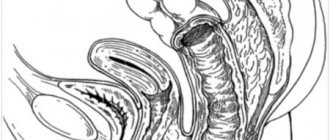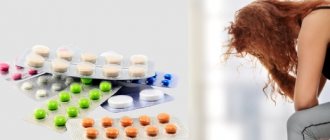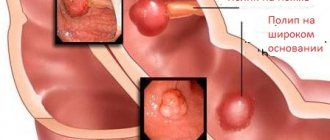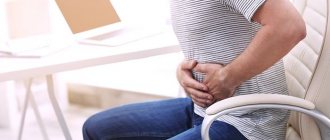Functional disorders of the gastrointestinal tract constitute a group of heterogeneous (different in nature and origin) clinical conditions, manifested by various symptoms from the gastrointestinal tract and not accompanied by structural, metabolic or systemic changes. In the absence of an organic basis for the disease, such disorders significantly reduce the patient’s quality of life.
To make a diagnosis, symptoms must exist for at least six months with active manifestations for 3 months. It should also be remembered that the symptoms of gastrointestinal tract can overlap and overlap each other in the presence of other diseases not related to the gastrointestinal tract.
Causes of functional disorders of the gastrointestinal tract
There are 2 main reasons:
- Genetic predisposition. FGITs are often hereditary. This is confirmed by the frequent “family” nature of violations. During examinations, genetically transmitted features of the nervous and hormonal regulation of intestinal motility, the properties of receptors in the walls of the gastrointestinal tract, etc. are found to be similar in all (or across generations) family members.
- Mental and infectious sensitization. These include acute intestinal infections, difficult conditions of a person’s social environment (stress, misunderstanding from loved ones, shyness, constant fears of various nature), physically difficult work, etc.
Diagnosis of gastrointestinal diseases
Today, thanks to technological progress in modern gastroenterology, a thorough diagnosis of all organs of the gastrointestinal tract is possible. It consists of:
- Ultrasound - ultrasound examination;
- FGDS and irrigoscopy – endoscopy of the gastrointestinal tract;
- intragastric pH-metry;
- manometry of all digestive organs;
- electrogastroenterography;
- radiology diagnostics;
- biopsies.
Treatment, as well as diagnosis of any gastrointestinal diseases, is recommended to be carried out exclusively by a qualified gastroenterologist. This will help minimize discomfort.
Symptoms of functional gastrointestinal disorders
Depends on the type of functional disorder:
- Irritable bowel syndrome (large and small) is a functional disorder characterized by the presence of abdominal pain or abdominal discomfort and combined with disturbances in defecation and transit of intestinal contents. To be diagnosed, symptoms must have existed for at least 12 weeks within the past 12 months.
- Functional bloating. It is a frequently recurring feeling of fullness in the abdomen. It is not accompanied by a visible enlargement of the abdomen and other functional gastrointestinal disorders. A bursting feeling should be observed at least 3 days a month for the last 3 months.
- Functional constipation is an intestinal disease of unknown etiology, manifested by constantly difficult, infrequent bowel movements or a feeling of incomplete release of feces. The dysfunction is based on a violation of intestinal transit, the act of defecation, or a combination of both at the same time.
- Functional diarrhea is a chronic syndrome with relapses, characterized by loose or unformed stools without pain and discomfort in the abdomen. It is often a symptom of IBS, but in the absence of other symptoms, it is considered as an independent disease.
- Nonspecific functional bowel disorders - flatulence, rumbling, bloating or distension, a feeling of incomplete bowel movement, transfusion in the abdomen, an imperative urge to defecate and excessive discharge of gases.
What are the symptoms of IBS?
A patient may suspect signs of IBS if his intestinal problems are associated with a psychogenic factor, that is, they include a reaction to a change in emotional state - excitement, anxiety, frustration. Often, symptoms can be triggered by stress before an important event or while traveling long distances - when the intestines stop working according to the usual pattern while traveling.
Sometimes the disease can manifest itself in the form of a so-called “refusal reaction.” A student begins to have severe stomach pain before an exam, which he is afraid of failing. In a person with symptoms of social phobia, with a fear of speaking in public, the attack is triggered by the looming need to make a report, when the imagination begins to paint pictures of failure or shame. In principle, such a reaction can occur several times in life in many people, but in patients with IBS it is consolidated, becomes rigid, that is, the body’s usual way of reacting: severe stress has already passed, but the stomach continues to bother every little thing.
Often, symptoms can be triggered by stress before an important event or while traveling long distances - when the intestines stop working according to the usual pattern while traveling.
IBS can occur in conjunction with panic disorder. There are people who, during a panic attack, experience a sudden strong urge to defecate. This is a separate type of panic attack.
An excess of exciting, stimulating substances in the blood (adrenaline, serotonin and other neurotransmitters) causes anxiety, fear, palpitations, a feeling of lack of air and other unpleasant bodily sensations, including excessive urination or loose stools. An attack, as a rule, develops quickly - within ten minutes, and lasts approximately twenty to thirty minutes. A person is overwhelmed by inexplicable horror. After experiencing a crisis, a feeling of depression, hopelessness, and self-pity appears. Having attacks several times gives rise to fear of repetition and “anxiety of anticipation.” Hence the fear of IBS sufferers to travel on public transport, go to theaters, cinema, and on dates.
Treatment of functional gastrointestinal disorders
Complex treatment includes dietary recommendations, psychotherapeutic measures, drug therapy, and physiotherapeutic procedures.
General recommendations for constipation: abolition of constipation medications, foods that contribute to constipation, intake of large amounts of fluid, food rich in ballast substances (bran), physical activity and elimination of stress.
If diarrhea predominates, the intake of coarse fiber into the body is limited and drug therapy (imodium) is prescribed.
If pain predominates, antispasmodics and physiotherapeutic procedures are prescribed.
Non-pharmacological therapy
In combination with drug treatment of the disease, additional methods and techniques are recommended that speed up the healing process:
- physical activity within acceptable limits (for example, yoga). If you are overweight, it is also necessary to use programs to reduce your body mass index;
- dietary nutrition that excludes the use of poorly digestible substances, but includes foods enriched with soluble dietary fiber. In addition, it is necessary to exclude the use of products that cause gas formation;
- psychological consultations, stress management training programs.
"First aid" for intestinal upset
While the cause of the intestinal disorder has not been reliably determined, the following will help alleviate the patient’s condition:
- drinking plenty of water;
- diet. Until the cause of diarrhea is determined, it is recommended to limit food intake as much as possible. You can eat viscous porridge, steamed or boiled lean meat;
- enterosorbents are substances that absorb toxins, poisons, irritants from the gastrointestinal tract and remove them out. Universal medicines for stomach and intestinal upsets - Polysorb, Enterosgel, Algisorb, Pektovit, Colistyramine, Smecta, Polyphepan, activated (black tablets) and white coal. For the intestines, there is no difference between black and white coal; both drugs are safe and effective. The only difference is that white coal adsorbs toxins more actively, so you need to drink much less of it (2-4 capsules of “white” versus 6-8 tablets of “black”).
For example, you can drink Regidron and activated carbon. But there is no need to rush into taking antidiarrheal drugs. If diarrhea is caused by poisoning or intoxication, you must first remove the harmful substance from the body, and then begin to deal with frequent bowel movements. If you stop diarrhea earlier, the harmful substances will be completely absorbed into the blood, and it will only get worse.
Activated charcoal is the most famous fighter against intestinal disorders.
Literature
- E. A. Lyalyukova, V. N. Drozdov. “Unspecified dyspepsia”: differential diagnosis, tactics for patient management at the outpatient stage. Attending doctor. No. 8, 2021.
- E. I. Vovk. Functional and organic dyspepsia: “crossover” of diagnostic and treatment strategies in general practice. Attending physician. No. 9, 2012.
- Instructions for use of the drug IMODIUM® Express
- Register of medicines in Russia. Active ingredients. Loperamide. https://www.rlsnet.ru/mnn_index_id_637.htm.
- A study by Ameri et al. "A multicenter, double-blind study: a comparison of the effectiveness of loperamide in acute diarrhea with two popular antidiarrheal agents and placebo," 1975.
What to drink if you have an intestinal disorder?
Lots of salted liquid.
If you have diarrhea, it is important to drink a lot
To prepare a rehydration solution, you can use:
- powders and granules: Hydrovit, Glucosolan, Normohydron, Regidron, Humana electrolyte, Citraglucosolan;
- tablets: Gastrolit.
You can make your own oral rehydration solution. To do this, you need to dissolve 3 g of salt and 18 g of sugar in 1 liter of water.
What medications to take in the future for intestinal disorders, and whether they are needed, will be determined by tests and information collected by the doctor about the events preceding the onset of diarrhea.
How to treat intestinal upset caused by poisoning?
Poisoning is easily recognized by vomiting with a further increase in temperature. In this case, the most important thing is to remove the toxic substance and decay products from the body as quickly as possible. Therefore, do not rush to take Loperamide and analogues. Induce vomiting, rinse the stomach. Then drink any sorbent, for example, activated carbon, and try to drink as much as possible. For the first day, it is better not to eat at all, try to lie down more, especially if the temperature has risen. On the second day, you can start eating dietary foods: light broths, pureed soups with rice and vegetables, liquid viscous porridges, jelly. Anything that irritates the walls of the stomach is prohibited: soda, marinades, smoked foods, sweets, fatty foods.
In case of poisoning, the liver suffers, so at the same time as medications for stomach and intestinal upsets, you need to take hepatoprotectors (for example, Gepabene, Karsil, Ursoliv, Essentiale Forte N). Milk thistle seed meal is considered a good natural hepatoprotector, but if you have diarrhea, you should not take it - it will irritate the intestinal walls.
Diarrhea in case of poisoning is a protective mechanism that removes harmful substances from the body
Tablets for intestinal upset
Antidiarrheal drugs (Loperamide, Phthalazol, Imodium Express, Lopedium, Stopdiar, Superilol) slow down the motility of the gastrointestinal tract, as a result of which diarrhea stops. They allow you to get rid of cramps for a while so you can get home or to the doctor. But to eliminate the cause of diarrhea, additional medications will be required, for example, in the case of a bacterial infection, antibiotics. For stomach and intestinal upsets, medications can be taken in the form of tablets or powders.
Papaverine, No-Shpa, Drotaverine, Papazol, Spazmalgon, Niaspam, Neobutin will help cope with spasm and the pain syndrome caused by it.
Tablets for stomach and intestinal upset are best taken with water or rehydration solution. Drinks that enhance peristalsis (coffee, tea, soda) are prohibited - they weaken the effect of the drugs.
If you have an intestinal disorder, do not rush to take pills - consult your doctor first
How to diagnose diarrhea?
Some patients confuse stomach upset and intestinal upset. These are not identical concepts, so treatment regimens and medications for stomach and intestinal disorders differ.
- Indigestion is a condition where pain is localized in the upper abdomen. In this case, nausea, bloating, heartburn, sometimes irritation of the esophagus and pharynx are felt, vomiting, belching, and a feeling of fullness in the stomach appear.
- Intestinal disorder is a condition where pain is localized in the middle and lower abdomen. Most often it is caused by the intense formation of gases and their movement. The stomach growls, diarrhea begins, and the stomach feels full from the inside.
In some cases, diarrhea is accompanied by fever, pain and dizziness may occur. Feces are colored green, yellow, light brown, black, white, and may contain mucus and blood. The color of stool is included in the list of indicators by which gastrointestinal diseases are diagnosed and remedies for stomach and intestinal disorders are selected. With prolonged diarrhea, when the patient does not eat anything, the stool becomes watery.
Stomach upset and intestinal upset are different concepts
Survey
First of all, our specialist will perform an external examination and palpation of the abdomen, and, if necessary, a rectal digital examination. For a more accurate diagnosis, you will have to take some tests (blood, urine and, of course, feces), as well as undergo an ultrasound of the abdominal organs.
If a doctor at our clinic suspects a specific disease, there may be a need to conduct additional research at a diagnostic center. In particular, you may be prescribed:
- gastroscopy
- computed tomography of the abdomen and pelvic organs
- colonoscopy
- ERCP
- irrigoscopy
- sigmoidoscopy.
Thanks to the use of new generation equipment and the professionalism of our doctors, discomfort from the procedures is minimized.
See also : Make an appointment with a gastroenterologist.
When should you seek help?
If you know exactly the reason for the change in stool (poisoning, change in diet on a business trip, taking medications), then you can limit yourself to remedies that eliminate discomfort. And when the cause of constipation or diarrhea is not clear and the appropriate medications do not give the desired effect, it is worth visiting our doctor.
Black or light-colored stool is also a signal that you should seek help from our clinic’s specialists. And of course, you should not delay visiting a doctor if there is blood in your stool.
How to treat intestinal upset after taking antibiotics?
Along with the harmful bacteria that cause the disease, antibiotics also destroy beneficial microorganisms. The intestinal microflora suffers most from their action. To avoid dysbiosis and associated intestinal disorders, when taking antibiotics you should drink probiotics, for example, Lactiale, Bifidumbacterin, Enterozermina, Linex or Hilak forte. If digestive disorders are systemic in nature, it is better to use synbiotics instead of probiotics, for example, Fluvir or Derma Pro. These are combination drugs that contain both prebiotics and probiotics. They are more expensive, but supply the body with more beneficial bacteria.
You need to take probiotics longer than antibiotics. For example, if the course of antibiotic treatment is 10 days, probiotics should be taken for up to 14 days. You need to take the probiotic at least 3 hours after taking the antibiotic. For example, if you take antibiotics at 8:00 and 20:00, then probiotics can be taken at 11:00 and 23:00.
Antibiotic-related bowel upset may begin 2 to 3 days after finishing treatment. In this case, you need to take a new drug for the intestines. For example, if you took a probiotic, you need to drink a synbiotic. Before this, of course, you need to consult with the doctor who prescribed the antibiotic, or with a gastroenterologist.
Taking antibiotics is a common cause of diarrhea
It is best to select probiotics based on the results of stool culture. In this case, you will populate the intestines with exactly the bacteria that are lacking there. However, culture results have to wait 4–5 days, and diarrhea must be prevented as quickly as possible. Therefore, when prescribing probiotics, the decision is made almost at random.
Some patients prefer to use natural yoghurts instead of probiotics. This method of restoring beneficial intestinal microflora deserves attention provided that you are not allergic to milk. The main disadvantage of the method is that it is not known for certain which bacteria enter the body and their dosage. There may not be enough bacteria and diarrhea will still occur.






